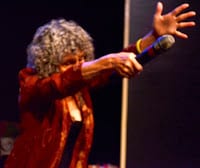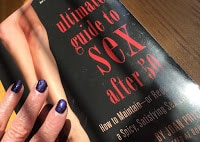Posts Tagged ‘senior sex aging’
Free Fall: A Late in Life Love Affair, an erotic memoir
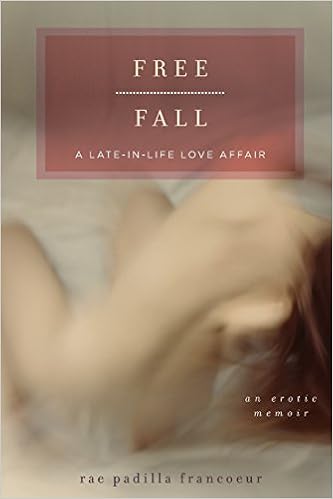 11/1/17: I’m reminding you of this October 2010 book review because I think Rae’s book is brilliant, engrossing, and passionate. I want to be sure you know about this sexy memoir. — Joan
11/1/17: I’m reminding you of this October 2010 book review because I think Rae’s book is brilliant, engrossing, and passionate. I want to be sure you know about this sexy memoir. — Joan
“Where are the books by and for women over 50 that deal honestly with sexuality?” I’ve asked myself for years. Dozens of self-help books for our age group have appeared in the past four years, thank goodness, but where are the sexually honest novels and memoirs that talk about our lives, our passions, our desires, our sexuality, our inner lives? Finally — Free Fall: A Late in Life Love Affair by Rae Padilla Francoeur arrives with honesty and sizzle.
Free Fall is an erotic memoir and much more. Rae Padilla Francoeur, age 58, begins a love affair with Jim, age 67. It’s hot, very hot, explosively hot. Rae describes the passionate details — how he touches and controls her body, how her passions smolder, build, and erupt. As graphic as her details are, I’m pleased that she uses language our generation is comfortable with — penis, vagina — instead of the edgier language that characterizes most contemporary erotica.
And, oh my, this book is beautifully written:
I am shameless. I will slide over every inch of him, kissing him back, wrestling in all that sweat to stay on top. I am sure I will never get enough of him. He will find this out and, being the man he is, he will revel in trying to find the outer limits of my stamina and prowess. He never will.
…
I’ve become so still and quiet and deep in the zone where my brain is one massive sensor hooked into the places he touches and the places I touch. There is nothing else. I’m all body.
…
We’re kissing each other like the end of time is on the other side of the door. We kiss like this for ten or fifteen minutes until suddenly Jim stops it all. He steps back. He pulls my skirt over my hips. He takes my hand and places it on his penis.
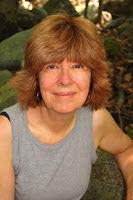 |
| Rae Padilla Francoeur |
Free Fall: A Late in Life Love Affair is one of the best books I’ve read in years. I hope you’ll read it for yourself, and let us know what you think.
Why Don’t They Ask Us?
I’m sure you’ve seen news stories that announce how often seniors are having sex or how much we enjoy the sex we’re having. A problem I have with many of the studies about sex and aging is that they often don’t define “having sex.”
Does “having sex” mean partnered sex only? (Solo sex is real sex!) Heterosexual intercourse only? Orgasms? Are they asking whether we’re having the same kind of sex we used to? What if we’re enjoying new ways of having sex?
 If we give a partner an orgasm and the partner gives us an orgasm, but there’s no PIV (penis in vagina), did we have sex? I say yes. If we haven’t had partner sex for a year but we give ourselves weekly orgasms with our favorite vibrator, are we sexually active? I say yes.
If we give a partner an orgasm and the partner gives us an orgasm, but there’s no PIV (penis in vagina), did we have sex? I say yes. If we haven’t had partner sex for a year but we give ourselves weekly orgasms with our favorite vibrator, are we sexually active? I say yes.
I don’t think we know much about what kind of sex seniors are having, once we broaden the definition of what sex is. My definition: Sex is any activity, solo or partnered, that gives us sexual pleasure, arousal, orgasm — and maybe, but not always, all three. Does that cover the kind of sex you’re having? Help me finesse this definition.
Let’s discuss this. How would you define sex at our age? And how has your definition of sex changed over the decades? If you’re willing to share your definition, or you have a comment on this topic, I invite you to post to the comments section. Your turn!
Seniors: How (and what) is your sex life?
It occurs to me that after 11 years of talking out loud (shouting, insisting, cajoling, writing) about senior sex, the questions that interviewers ask me have become quite intelligent and open-minded.
When I first started this work, interviewers would ask elementary questions (e.g. “Is it true that seniors are having sex?”) and would often place a value judgement on what they heard (e.g. “Yeah, but eeuuww, the idea of my parents/grandparents having sex…!”)
But now, however young the interviewer is, there’s an open attitude, a nonjudgmental striving to understand. It’s not such an odd idea anymore that we aren’t retiring our genitals at some arbitrary age. This is progress! Or am I just lucky enough to be interviewed by smarter, more sex-positive interviewers?
One topic that interviewers find endlessly fascinating is that we’re not settling into old age passively or predictably. Many of us decide that it’s time to go after what we want, whether or not it’s what we used to want or ever thought we’d want.
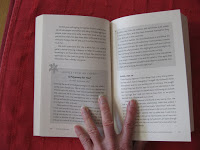 I wrote about this in the “Stretching Boundaries” chapter of The Ultimate Guide to Sex after 50, and many of you contributed your experiences in the “Off the Beaten Path: Nontraditional Sex Practices and Relationships” in Naked at Our Age. I’m often asked, “What percentage of seniors are into kink?” or “Are many seniors polyamorous?” or “Are most seniors happier with their sex lives than they were when they were young?” I sometimes answer, “I don’t collect statistics — I collect stories.”
I wrote about this in the “Stretching Boundaries” chapter of The Ultimate Guide to Sex after 50, and many of you contributed your experiences in the “Off the Beaten Path: Nontraditional Sex Practices and Relationships” in Naked at Our Age. I’m often asked, “What percentage of seniors are into kink?” or “Are many seniors polyamorous?” or “Are most seniors happier with their sex lives than they were when they were young?” I sometimes answer, “I don’t collect statistics — I collect stories.”
Yes, some studies have been done, but more often than not, research and surveys either overlook our generation entirely or only study straight relationships and define sex as heterosexual intercourse, which is just one form of sexual expression. I don’t think that our generation is being asked the right questions about what we do, what we want, and how we feel about it.
So I’m opening this up to you: If you’re over 50 (lots older is fine!) and you find that your ideas have changed about what you want your sex life to be, please feel free to comment with your views and especially how those views have changed in recent years. Please give yourself a first name (doesn’t have to be real) instead of “Anonymous” and include your real age. (If you have any trouble posting a comment, email me with the subject line “blog comment: how and what” and include what you want to say, what name you want to use, and your age, and I’ll post it for you.)
I started this discussion on my Naked at Our Age Facebook page, which I hope you’ll read, “like,” and share. Thanks!
Learn more about my most recent book, The Ultimate Guide to Sex after 50. Order here for an autographed copy, purchase from your local independent bookstore, or order from Amazon.
Are you having sex? What does that mean?
It’s important for us to redefine what we mean by “having sex” and being “sexually active,” especially with our changing bodies, relationships, and circumstances as we age.
- How old are you, and how would you define “having sex” or being “sexually active” at this age?
- Do you consider solo sex to be “real” sex? Why or why not?
- If you were surveyed about whether you are sexually active, how would you answer? What would you mean by that answer?
- Has your doctor or other medical professional asked you about whether you’re sexually active?
- If you asked your doctor or other medical professional about a sex-related concern? How did that go?
#AdultSexEdMonth

